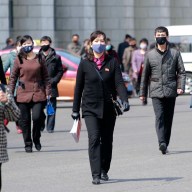From housing to health care, First Nations people who don’t live on reserves often face the same challenges as people who do, the Mi’kmaq Native Friendship Centre says.
“We deal with a lot of the same issues that are on-reserve,” Pamela Glode-Desrochers, associate executive director of the community centre nestled on Halifax’s Gottingen Street, said late last week.
But one of the biggest barriers, she said, is the lack of funding for a fundamental community resource that is seeing more and people walk through its doors.
“We have the same amount of money that we had 15, 20 years ago, but we’re servicing more and more people,” Glode said. “There’s a transition of people coming from reserve into the city to find jobs or (go to) school.”
She estimated the centre currently helps more than 1,000 families in the municipality’s urban core, whether that’s through the youth program, adult learning, employment services or even a needle exchange and methadone clinic.
“We have a lot of people living on the streets (and) we have people coming out of institutions that we deal with on a regular basis,” she said.
At the same time, many local natives are “going to university, have jobs or are doing something on their own that has helped them make the transition to the urban environment,” John Paul, executive director of the Atlantic Policy of First Nation Chiefs, said recently.
He said there are plenty of successful Haligonians who haven’t sacrificed their Mi’kmaq identity, adding resources such as the friendship centre help local native communities stay connected.
There are 5,000 First Nations peoples living across the municipality, Paul said.
“People come here with the belief that this is an area of opportunity,” he said. “A lot of them have stuck it out and have carved out their own lives for their own families, like everybody else in Halifax.”












